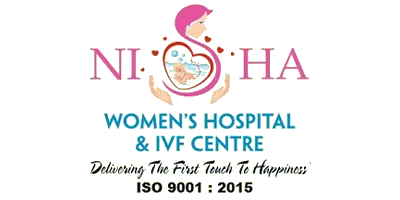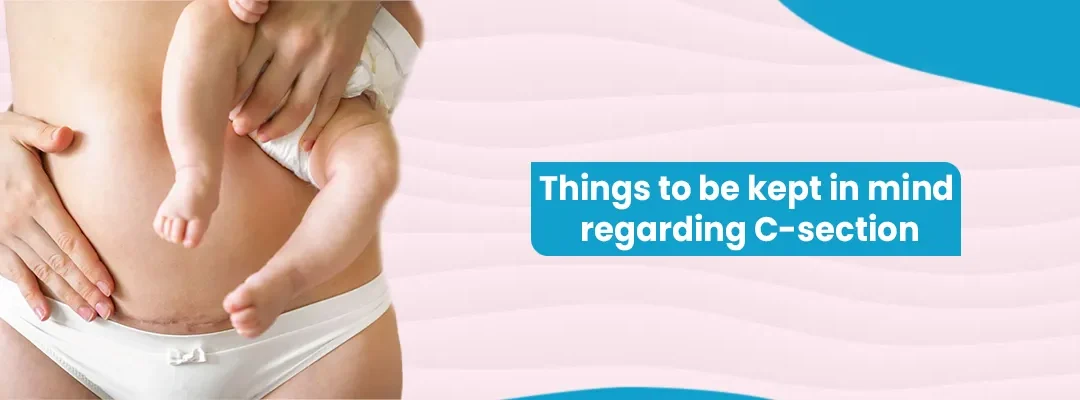When is C-Section needed? Do I require it? When should one go for C-Section? If these are a few of the many questions that you want to be answered, consult Dr. Himali Maniar of Nisha Hospital, who is one of the best gynecologist in Bopal.
C-section or Caesarean delivery is one of the surgical procedures in which the baby is delivered through the incisions taken on your abdominal and the uterus.
A C-section would be needed only if you have pre-delivery complications or probably when you don’t wish to go ahead with vaginal birth after a pre performed C-section. However, the necessity of a C-section during your first delivery may arrive only when you go into labor. Dr. Himali Maniar, a renowned gynaecologist in Bopal, tells us more about the necessity of a C-section procedure.
Is a C-section safe for my baby and me?
“Although C-section is a simple and fast procedure, it has certain risks. As a trend, many mothers nowadays opt for C-sections as they can time the delivery at their convenience. You should be aware of the pros and cons associated with normal delivery and C-section” says Dr. Himali Maniar, one of the best gynecologists in Bopal, Ahmedabad.
Do I have the choice of selecting the delivery procedure for myself?
Babies come into this world in two ways; either through vaginal birth or through surgical delivery. If the first delivery is a C-section, there are many chances that the mother might have to go for a repeated C-section the next time. Several reasons decide the procedure one should go for during the second or consequent delivery.
In cases like twins’ birth, the baby’s position inside the womb and the mother’s health condition may force the surgeon to recommend a C-section to you. Mothers with high blood pressure, infectious diseases like genital herpes or HIV, or problems with the placenta are more likely to be asked to go with a C-section.
Although C-sections are mostly considered safe and, in some cases, even life-saving, there are always risks associated with them. Nisha Women’s Hospital takes utmost care of the mom and the baby post-C-section.
When should I opt for a C-section?
Depending upon the circumstances, your gynecologist may recommend you for a C-section. Few of them could be;
- When your labor is halted. Stalled labor is one of the most likely reasons for a C-section. It might occur when your cervix, the lower part of the uterus that opens in the vagina, does not open sufficiently.
- Your baby or babies are positioned in an unusual position. In such a case, a C-section should be the harmless way of delivering the baby if its buttocks or feet first enter the birth canal or if the baby is positioned side or shoulder first.
- When your baby is in distress. Your gynecologist may recommend you go for a C-section if they observe any abnormality in your baby’s heartbeat.
- When you carry multiples. A C-section may be needed when the leading baby of your twins is positioned abnormally or if you have triplets or more babies.
- Prolapsed umbilical cord. A C-section might be needed if a loop of the umbilical cord slips ahead of the baby through your cervix.
- When there is a problem with your placenta. A C-section is more likely to be recommended if your placenta covers your cervix’s opening.
- When you have serious health issues. A C-section can be recommended if you have a heart or brain condition. Even if you have an active genital herbs infection, you may be advised a C-section.
- If you’ve had a previous C-section. Depending on the previous uterine incision, VBAC (Vaginal birth after cesarean) is often possible. However, the gynecologist might suggest you go for a C-section, depending on your condition.
- In case there is mechanical obstruction. Your gynecologist may recommend a C-section if you have a huge fibroid obstructing the birth canal. They may also suggest a C-section if you have a severely moved pelvic fracture. In an abnormal condition of the baby having a larger-sized head, you may be recommended a C-section. Consult Dr. Himali Maniar, one of the best gynecologists in South Bopal
Is it worth taking risks associated with C-sections?
“One needs to weigh the benefits and risks both before deciding with the doctor. Risk to benefit ratio must be considered before coming to a conclusion. Both the ways of delivery these days have become very safe, keeping in mind the advances in the medical field. So discuss openly with your gynaecologist” says Dr. Himali Maniar, gynaecologist from Bopal, Ahmedabad. If the risks of normal delivery outweigh the benefits, then it maybe better to opt for C- section. Like any other surgical procedure, there are certain risks associated with C-section. Both the baby and her mother may face specific issues after C-sections.
Risks to your baby
- Surgical injuries. Although rare, accidental nicks to the baby’s skin are likely to occur in the surgery.
- Breathing problems. If the C-section is pre-planned, the baby may face breathing issues during the initial few days. Transient tachypnea, associated with fast breathing, is more likely to develop after C-section.
Risks to you
- Infection. Sometimes if medications aren’t taken regularly or hygienic conditions are not maintained post-C-section, one may develop infections.
- Reactions to anesthesia. You are prone to adverse reactions to any anesthesia.
- Wound infection. Depending on the necessity of an emergency C-section, your surgical wounds too may cause infection.
- Postpartum hemorrhage. You may experience profuse bleeding during or after the delivery.
- Blood clots. Emerging blood clots in the deep veins, mainly in the pelvic region or the legs, are more likely to increase post-C-section.
- Risk in future pregnancies. With C-section delivery, your next attempt for vaginal birth after cesarean (VBAC) has a potential risk of your uterus ripping open alongside the scar line from a previous C-section.
- Surgical injury. It may call on for additional surgery if your C-section surgery causes damage to your bowel or the bladder. Even though the chances of such injuries are less, one cannot eliminate their occurrence. It is advisable to talk to your gynecologist to understand all the risks associated with the surgical procedures. Consult Dr. Himali Maniar, one of the best gynecologists in Bopal.
How long will it take for me to recover after C-section?
Although the recovery time after C-section may vary from person to person, it usually takes nearly six weeks to recover post-surgery. The surgical wound would take a couple of weeks to get healed. It may extend in case you have other complications.
You might need to take painkillers 7-10 days after the C-section. Consult your gynecologist before self-medication. Nisha Hospital provides you with the best services to make you feel comfortable and recover fast.
Are there too many restrictions after C-section?
The days following the delivery, known as the postpartum period, can be challenging for the mothers and families. This period can be more challenging for mothers who have undergone cesarean delivery. It is of utmost importance for the mothers to take care of post-C-section.
A few things that should be avoided for safety and faster recovery are:
- Lifting objects heavier than your baby
- The use of douche or tampons
- Sexual intercourse until your doctor tells you it’s safe to do
- Hot tubs and public pools
- Exercise until allowed by your doctor
- Repeated use of stairs
Can I ever have a normal delivery (vaginal) after C-section?
If you are pregnant again after the arrival of your first baby via C-section, you might wonder if vaginal birth after cesarean (VBAC) is a valid option for you. Although there are many risks associated with VBAC, you may discuss all the possibilities with your doctor before your delivery.
Your safety and your baby’s safety is the primary goal when deciding on the type of delivery you should go with after a previous C-section. VBAC may not be safe for every woman post-C-section.
If you are prone to high risks associated with VBAC post-C-section, your doctor may not recommend you a VBAC as it can lead to severe issues for you and your baby, which can be fatal for both the mother and the baby. Hence it would help if you discussed the chances of VBAC with your doctor well in advance. Doctors at Nisha Women’s Hospital are always available for consultation.
Do I have to wait for long to hold my baby after the C-section?
If you fear that you may not be able to hold your baby immediately after the cesarean, then probably you are wrong! You can hold your baby once the surgeon stitches the uterus and closes the abdomen’s incision. You may even try to breastfeed your baby if you wish to do so.
However, not every mom gets to hold the baby soon after the C-section.
Will C-section impact my milk supply?
Few moms who have had C-sections find that their milk comes in a little later. This is probably due to the additional stress they might have gone through due to the surgery. You can keep feeding your baby if you follow a few guidelines.
- Cuddle your baby as much as possible. Skin contact enhances your much-needed milk supply.
- Start the nursing classes as soon as possible.
- Nurse regularly, every 3 to 4 hours, day and night.
- Use the pumping method if you cannot feed your baby within 12 hours or if you face issues with getting your supply up and running.
Are there any long-term effects of C-sections?
Women who have had C-sections may face a few issues later. There is a potential risk of the incision scar tearing open during subsequent pregnancy or labor and placenta-related other problems.
It is always good to consult your gynecologist and discuss all the probabilities regarding the birth procedure of your baby. Do not hesitate to see your doctor post-C-section if you notice any unusual thing that you come across while bringing up your little one.

